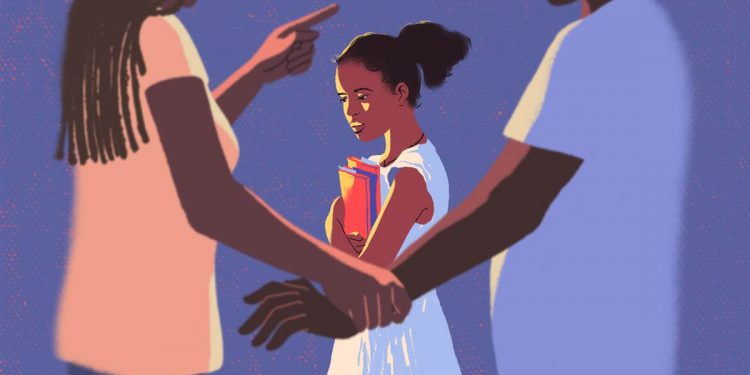By Mengisteab Teshome
Eighteen years ago, in Oromia State, Kersa Woreda, Jimma Zone, a baby girl came to this world.
Derartu Abba Raya, as she grew up, started to show greater inclination to attend schools along with her peers. At the beginning, her desire for schooling was not denied by her families. Derartu was a committed girl and becoming a medical doctor was her childhood dream.
However, as time goes by and her grade level progressing well, her mother and father came up with two opposing ideas with regard to her schooling.
While her father insisted on her keeping on her study, her mother urged her to go through with arranged marriage. This (the idea of getting married) was not an acceptable idea for Derartu and remained in her education rejecting her mother proposal.
Derartu, 18, attending her school, in Bulbulli Secondary Schools, in Oromia State, Kersa Woreda, Jimma Zone. As she stated following school closure due to COVID-19 pandemic, four of her classmates got married. “Taking the pandemic as an opportunity, the girls’ families did this deliberately by making the arranged marriage.”
“Though both the pandemic and the ingrained traditional views towards girls have led girls to early marriage, with the help of my father and my conviction I am safe.”
I had completed 12 through facing real challenges that stem from nature and culture but thanks to my father the future is brighter than ever before to me.
Derartu was one of the students, who received Hygiene kit-reusable pads- distributed by Plan International African Union Liaison and Pan Africa Program Office.
After receiving a pack of two thousands reusable pads, Derartu said that it is a great opportunity for girls because many girls are obliged to be absent from classes during their periods.
When I was in my lower grade, I experienced missing classes for I had no pad during my periods. I am delighted that Plan International African Union Liaison and Pan Africa Program Office and Kersa Woreda working to the communities who have had such kind of pressing challenges.
Yohana Solomon, AU Liaison Office, noted that education is one of the best tools to eradicate poverty, we want to urge everyone to maintain education despite ascribed challenges, and the liaison supplied the reusable pads to show its solidarity.
Rawda Awol, Head of Child and Youth Affairs of Kersa Woreda, for her part noted that the pandemic has been one of the factors to the increments of early marriage.
“We have been working with law enforcement bodies and elders of communities to curb early marriage. Though we could not address the whole, we succeeded in stopping four marriages through the consent of both sides and following legal procedures.
As to Rawda, every year events, such as women’s day, are organized in urban areas; but not in the rural areas. “In my view, it is fundamental to let the rural areas get the opportunities to be part of this kind of events. The rural communities can have opportunities and the messages can be communicated well to the grassroots communities.
Fedila Kadi, Jimma Zone Women Affairs Head for her part said that 40 percent of girls in Ethiopia got married before the age of 18; and 14 percent are married before they reached at their 15th birthday. To weed out such types of ill practice, the concerted efforts of all pertinent bodies at different levels and their practical engagement is crucial.
As to her, a number of girls have been rescued from child marriage in the zone on schools closure due to the Coronavirus pandemic.
Ketema Gemechu, Plan International Ethiopia Oromia Program Jimma Sub Office Manager, also noted that child marriage infringes girls’ right to education and other opportunities, and jeopardizes their health, increases the risks of exploitation, sexual violence, domestic abuse, as well as death during childbirth. “We should stand in unison to end child marriage.”
According to him, his Office has been supporting communities since the first COVID-19 case was reported by launching a response schemes and undertaking various awareness-raising and prevention activities, as well as food and hygiene kit distributions.
“We are committed to address the burden through exerting concerted efforts and supplying skill trainings and other inputs that could impact significantly girls’ education. In collaboration with development partners, we are mobilizing public resources to empower women at the grassroots.”
According to ‘Girls are not brides’, Ethiopia has the 14th highest prevalence of child marriage in the world, and has the fourth highest absolute number of women married or in a union before the age of 18.
The U.N. predicts there could be an extra 13 million child marriages by 2030 as COVID-19 hits household incomes and stymies global efforts to end the practice.
Read the original article on Ethiopian Herald.






